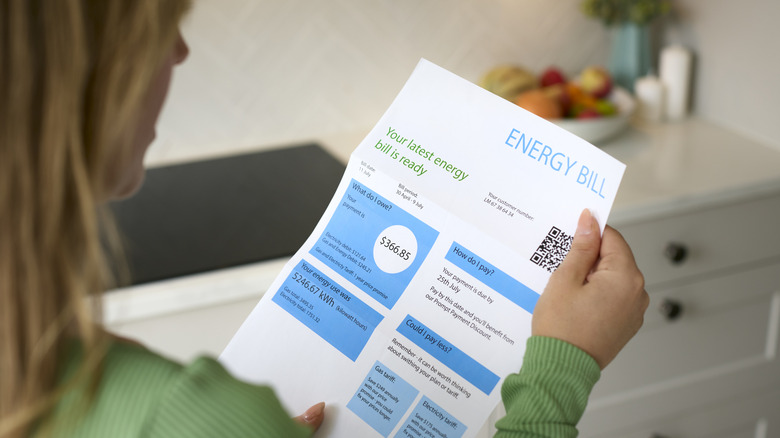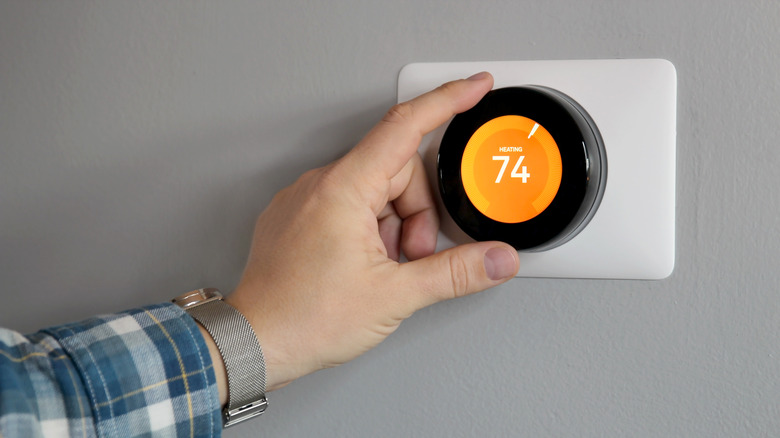The Startling Reasons Your Energy Bills May Be Soaring
Owning or renting a home is expensive enough already, but if you diligently check your bills, you may be sick of seeing the number rise. If your energy bills have been rising recently, you're not alone. Americans across the country have been getting hit with higher gas and electricity bills recently, even for those who avoid costly home heating mistakes. If you're frustrated by seeing another higher-than-average bill, you're probably wondering what's causing your energy costs to climb. There are many possible reasons; some, like changes in the climate, may be predictable, but others can be quite surprising.
A fluctuating climate can increase the cost of keeping your home at a comfortable temperature as summers get hotter and winters get colder. If your bills are higher than your neighbors' or seem to spike when you turn the heat on, there may be an issue with your gas pipelines leaking. In some cases, you may also be unknowingly fronting the cost for utility companies to update their infrastructure. And with its notoriously high energy usage, AI plays a role in increased energy bills, too. Despite all these causes, there are still ways to help lower your costs.
Why might your energy bills be increasing?
The first potential culprit for your energy bills is the climate. Heatwaves are getting more frequent and longer, and in general days are growing warmer, leading many people to crank up the air conditioning. Between increased energy demand and usage, climate change is one of the most direct links to your higher energy bills.
Old or leaky gas pipelines can exacerbate high gas costs, especially in the winter. As you try to heat your home, gas escapes and makes you use more fuel to get your home to your desired temperature, driving your bills up. Fixing or replacing damaged pipelines can improve your home's efficiency. Similarly, companies also benefit from upgraded infrastructure. Utility companies are often natural monopolies, which means that construction for updating and maintaining infrastructure, usually for safety, can be passed to the consumers, making their bills higher than normal. If you've seen more construction crews around than normal, then this may be the reason for your higher bills. In fact, combined with taxes and utility costs, it's likely you are paying more for these than fuel itself. Additionally, federal bills ending tax credits for clean energy can increase demand for natural gas, eventually resulting in higher costs for you.
Finally, your increased energy bill may be related to the growing use of AI. Just as utility companies pass costs of updating their infrastructure to consumers, they can pass the costs of expanding networks and building additional infrastructure necessary for data centers to function. Residents near AI data centers also experience higher electricity and gas bills due to the increased demand that raises the market price.
Can you do anything about your surging bills?
While there are a few potential causes for your soaring energy bills lately, it's hard to pin down just one, and the causes impact one another. For example, different weather patterns caused by the changing climate require more infrastructure repairs, and legislature influences what utility companies need to update. Your location will also influence which factors are contributing most to your soaring bills. You may live in an area experiencing more effects of climate change, or you may live near a data center.
No matter which cause seems to contribute the most to your bills, unfortunately, potential actions that could lower your bills may be limited. A good place to start, though, is by following some expert-approved tips to lower your utility costs. Check for any inefficient appliances, lights left on, or HVAC issues that may lead to higher energy usage. An energy audit is one way to check for potential drains, and learning the cheapest time of day to run household appliances may also help you out. Another option is to participate in state and local politics, such as electing Utility Commissioners who oversee gas and electric companies, to make sure your interests are represented. Finally, if the rising costs are a local issue, moving to an area with less data center demand or milder weather might be worth considering, especially because energy bills are expected to continue to rise in the coming years.


